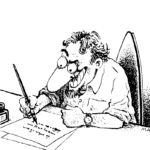GRAMMAR/USAGE
Outdated Grammar Rules
Four long-standing usage “rules” you can safely ignore
 Adhering to the basic rules of grammar and usage is no less important today than it has always been—but with one difference: Many of the “written-in-stone” rules are no longer as sacred as they once were, especially when it comes to routine documents.
Adhering to the basic rules of grammar and usage is no less important today than it has always been—but with one difference: Many of the “written-in-stone” rules are no longer as sacred as they once were, especially when it comes to routine documents.
Zeroing In
Here’s a partial list of grammar “rules” that don’t carry as much weight as they once did.
1. Never start a sentence or clause with “and” or “but”.
Regardless of what you may have been told in your grade school and high school composition classes, it is not a grammatical sin to launch a sentence or clause with either of these widely used prepositions.
This: I was happy to hear that you’re going to be joining us at our reunion next week, but I was sorry to hear that you won’t be able to stay for the final day.
But never: I was happy to hear that you’re going to be joining us at our three-day hike next week. And I am very looking forward seeing you. And I was sorry to learn that you won’t be able to stay for the final day. Needless repetition of the conjunction “and”.)
2. Never end a sentence with a preposition.
The only time you need this largely outdated rule is when the preposition is unnecessary, as in “Where are you going to?” Otherwise, paying slavish attention to the rule will usually produce an awkward-sounding sentence.
This: I have no idea where this information came from (a sentence-ending ending preposition that produces a smoother flow).
3. Don’t use contractions.
Contractions were once deemed to be too “informal” for academic and business writing. But as long as you’re inserting the apostrophe where it belongs, there’s no grammatical reason for avoiding contractions in your everyday writing, especially in routine correspondence.
This: I’m sorry I wasn’t able to provide you with more information when we spoke earlier today, and I’m hoping that we’ll be able to continue that conversation in the near future.
4. Don’t split infinitives.
An infinitive phrase is a two-word combination that begins with “to” and ends with the root form of the verb, as in “to go”, “to find”, or “to believe”. Infinitives get split when the two parts of the phrase are separated by a modifier. In this instance, the question you need to ask yourself is whether the split disrupts the emphasis and flow of the sentence.
Split: The only thing you to keep in mind when you are following these instructions is to accurately measure the dimensions of your desk. (smoother flow).
Or: The only thing you need to keep in mind when you are following these instructions is to measure the dimensions of your desk as accurately as possible.